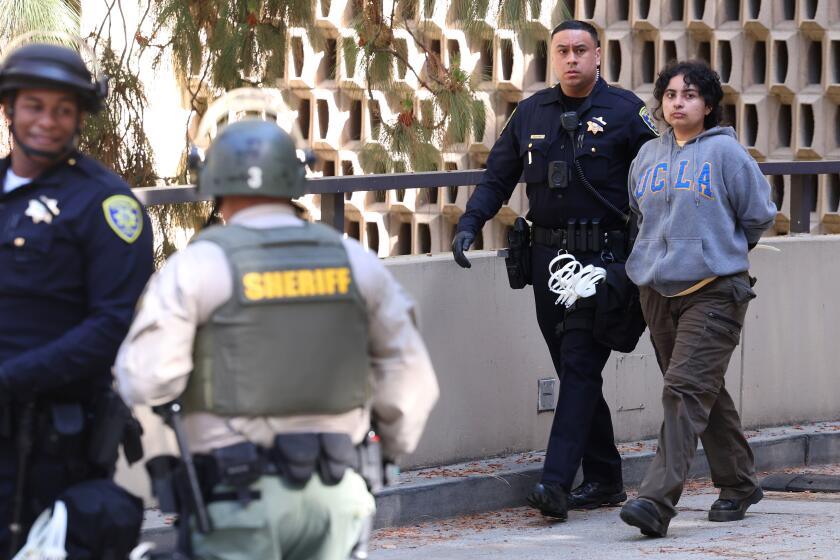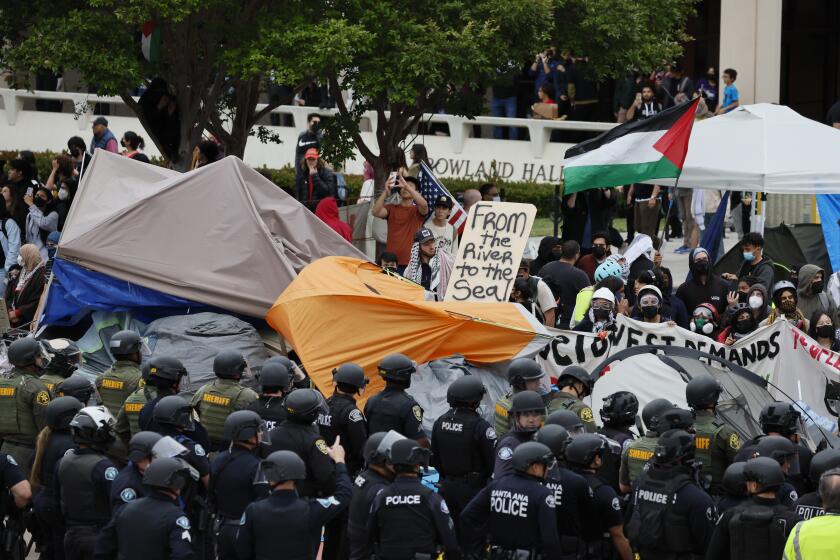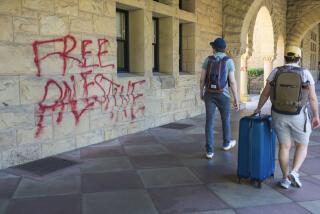Apology letters. Suspensions. After protest citations, students face campus consequences

- Share via
Elizabeth Howell-Egan, a third-year USC law student, avoided arrest while taking part in two pro-Palestinian campus encampments in the spring. But more than four months after police cleared the camps, she said she is facing repercussions worse than a misdemeanor court charge: She is banned from campus and classes as part of a suspension that could last through next spring.
Howell-Egan is in the midst of a university “resolution process” for allegedly violating USC codes of conduct during protests — obstructing campus safety officers, failing to comply with officer instructions and disorderly conduct.
At the launch of the fall term, universities are still grappling with the aftermath of a tumultuous spring. More than 3,000 students nationwide were arrested as police broke up encampments where pro-Palestinian protesters demanded universities divest from financial ties to Israel. In many of those cases — including hundreds in California — low-level misdemeanor charges were never filed or have been dropped.
But it’s a different situation on campus, where administrators say protesters endangered safety and broke conduct codes, including vandalizing property, blocking pathway and building access, and defying orders to disperse. Discipline proceedings continue as students deal with ongoing suspensions and holds on their records, uncertain of the consequences on their education.
Many students have seen charges dismissed, but cases remain unresolved for hundreds of protesters at campuses with the highest number of arrests.
USC and other campus officials contacted by The Times said they could not discuss details of student conduct cases, citing the Family Education Rights and Privacy Act. Amid widespread calls for amnesty in the spring, the University of California regents affirmed that protest violations without consequences were “inconsistent” with UC guidelines.
“USC’s really leaning into the idea that the process is the punishment,” said Howell-Egan, also charged with being a leader in USC’s protests, although she described her role as a public liaison to police. “I don’t know if their intention is to make me regret our activism, but what it really does is strengthen my beliefs.”
Letter of contrition
As part of the process, the university’s Office of Community Expectations has directed her to craft a four-page reflection essay about her behavior.
Other students have received similar assignments, due in late September, to write “personal thoughts, experiences, and insights” from the protest and “how you might make different decisions in the future.” The papers “may not serve to justify your own actions or evaluate the actions of others,” and must be “double-spaced, 12-point Times New Roman font with one-inch margins,” according to a copy of the instructions shared with The Times.
Howell-Egan said she didn’t expect protests to be consequence-free. “But this is all absurd,” she said. A hearing date has not been scheduled, and she is applying for leave to avoid missing more classes.
“People are being killed in Gaza,” she said. “That’s why we protested. Is that wrong?”
Students return to colleges after spring of protests to campuses with increased security, ID checks and free speech regulations.
What happens in a conduct hearing?
Unlike court cases, student conduct proceedings can vary widely by school in style and timeline and are shielded from public view by privacy laws. Officials at USC and other California universities said they are committed to a timely and fair process.
Some students in the midst of the process at California campuses — including USC, UCLA, UC Irvine and Cal Poly Humboldt — said the cases against them are vague — and several graduates said they are still awaiting diplomas because of record holds that haven’t been lifted.
Conduct proceedings have existed for decades to adjudicate violations of campus codes, which students routinely sign off on or are presented during orientation. Many colleges have conduct offices with full-time staffers who handle caseloads, doing the work of guidance counselors, investigators and judges.
Schools have wide latitude in filing internal charges over protests, experts said, including defining standards of evidence, lengths of investigations and discipline.
“This year has undoubtedly been a year-to-year increase” of student violations, said Brian Glick, a board member of the Assn. for Student Conduct Administration who has worked in the field for two decades at multiple universities.
He said procedures at USC and other schools — notices to students, interim suspensions, meetings with conduct officers or panels before final decisions, contrition essays and an appeals process — are common practices.
“As long as a university is content-neutral — that it treats one kind of protest the same as others when it comes to violations that disrupt — and is following its own policies equally for students, they are within the standards,” Glick said.
“The purpose is to balance campus safety with the educational mission. We’re trying to instill the idea of being a good community citizen,” said Glick.
At UC Irvine, five students are fighting back in state court after suing the university in August over campus disciplinary action against them, alleging that protest-related suspensions “constitute a clear violation of the university’s own rules and the minimum standards of due process applicable to public institutions.”
The students said in the suit that they went to hearings where the university “presented no evidence and made no meaningful findings” to show they were threats to campus. They said suspensions, which led to losing university housing and shifts at UC Irvine jobs, continue “with no end in sight.”
The University of California will enforce rules against encampments, blocking pathways and wearing some face masks as students begin returning to campus after a protest-filled spring, the system president told the UC community.
What universities revealed about discipline
Campus officials provided The Times broad information about their conduct proceedings with protesters.
In a recent update to its website about spring protests, USC said that 74 students were cited for campus violations between two encampments, resulting in interim suspensions over the summer for part of the group. Many of those cases, USC said, have been resolved.
Some students “received a formal warning that will be expunged from the student’s disciplinary record when they graduate.” Other cases “involving more complex or aggravated circumstances have gone through the interview stage but have not yet been completed.”
Like other major California campuses campuses, USC filed charges against students based on a “preponderance of evidence.” On its website, it says that means “the reviewer or panel decides whether it is more likely than not, based on the information gathered, that the student is responsible for a violation.” The threshold is similar to what is used in civil cases and is significantly lower than “beyond a reasonable doubt,” the standard for convictions in criminal cases.
UCLA and UC Irvine declined to say how many students were charged but said guidelines promised due process and the right of appeal. Police arrested more than 300 people on the campuses in May and June. Many were not students. There were also students who avoided arrest but violated campus policies.
At Pomona College, a spokeswoman said all cases from the spring had concluded.
At Cal Poly Humboldt, where an April student occupation of administrative buildings led to a campus shutdown, a spokeswoman said administrators issued 93 interim suspensions. Most cases are resolved and some pending. The outcomes ranged from warnings to suspensions.
At Cal State L.A., where students erected an encampment and occupied an administrative building, anonymity was a challenge to pursuing criminal or campus cases. “We have not taken disciplinary action. Those involved took steps to obscure their identity,” said Erik Hollins, a spokesperson for the university.
What students say
While colleges were mum on many details, students shared their experiences with The Times.
Like Howell-Egan, Rachel, a USC student studying humanities, received an interim suspension for participating in an encampment. It was lifted right before the fall semester kicked off Aug. 26 — with the condition that she sign off on the student handbook and write the letter of apology.
Rachel, who did not want to reveal her last name to due to fears of retaliation for her activism, said she obliged both requests to get back to class.
“I can write whatever they need me to write. But, ultimately, it doesn’t change my values,” she said.
At UCLA, student Dylan Kupsh received university paperwork with his charges on Aug. 29. The allegations stemmed from a June 10 incident where he was arrested along with 24 other people, who police said set up an an encampment between Dodd Hall and the School of Law. He said UCLA also charged him with disrupting a final exam, which school officials said was a result of the protest, and obstructing the movement of students and staff.
The University of California will enforce rules against encampments, blocking pathways and wearing some face masks as students begin returning to campus after a protest-filled spring, the system president told the UC community.
Kupsh, who is pursuing a PhD in computer science, said he was suspended from campus for roughly two weeks after the arrest. His student records are on hold. His next meeting with the Office of Student Conduct is Sept. 25, where he said he will review the alleged violations with a school official and have the opportunity to present his side. But Kupsh has grown concerned that if the process lasts too long, the hold may prevent him from receiving a master’s degree after the upcoming quarter.
Like others under investigation, Kupsh, a member of Students for Justice in Palestine, said the process — and new, stricter protest regulations on campus — “won’t stop people from protesting.”
“I think they are trying to discourage people before the quarter starts, especially by notifying us so late about what we are charged with,” he said. “But the gravity of the situation in Gaza necessitates and our university’s complicity necessitates us to continue making noise.”
Shenai Aini, a UC Irvine student, was arrested May 15 when police in riot gear swept an encampment and an occupation of a building. She and others said they played only small roles in activism.
A university citation in June against Aini, a rising senior, accused her of camping overnight, using amplified sound without a permit and unlawful assembly, among other violations. As evidence, the document cited a student newspaper article, photos of student protesters, witness statements and a memo by campus police.
The problem, according to Aini: Athough she was positioned by the camp in support of it that day, none of the evidence identifies her specifically.
“Nowhere in the evidence do I see myself identified in a way that connects me to the alleged policy violations,” Aini wrote back to the university, denying the accusations. “The only place where I appear in the evidence is on a list of names of arrested individuals.”
Aini, who is not a party to the suit against UC Irvine, is preparing to return to class Sept. 26. She has no disciplinary meetings scheduled.
“Right now, I have no idea what I can or can’t do at school,” she said.
More to Read
Sign up for Essential California
The most important California stories and recommendations in your inbox every morning.
You may occasionally receive promotional content from the Los Angeles Times.














